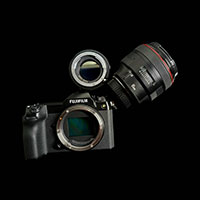What do lens adapters do, and how can you use them for your photography?
posted Friday, November 5, 2021 at 2:00 PM EST

As Canon and Nikon continue to expand their selection of mirrorless cameras and lenses, many more photographers are buying new mirrorless cameras and looking for adapters for their old DSLR lenses. For example, if you shot with a Canon DSLR for years, you want to be able to use your EF lenses on a new Canon mirrorless camera or perhaps even on a mirrorless camera from a different brand. There are many ways to mix and match lenses and bodies with a plethora of adapters. So many ways, in fact, that it can be confusing to understand what lens adapters will work for you. Over at Lensrentals, photographer Zach Sutton has written a new article all about lens adapters, how they work and why you should try them out.
First things first, what are lens adapters? Every camera has a lens mount. Each format and brand have their own distinct lens mounts. For example, the Nikon Z mount is different from the Nikon F mount, and they're both different from the mounts on any other manufacturer's cameras. While you can't mount a Canon EF lens directly on a Fujifilm GFX camera, for example, a lens adapter allows you to do so by creating a connection between the two different mounts.
In Sutton's article, that's precisely what he did. He mounted a Canon EF 85mm f/1.2L II prime lens to a Fujifilm GFX 100S camera using the Vizelex Cine ND Throttle Fusion Smart AF adapter. One end of the adapter has a GF mount and connects directly to the GFX 100S camera. The other end of the adapter has an EF mount, allowing Sutton to mount an EF lens to a GF mount.

Some adapters are 'smart' adapters, while others are 'dumb.' Smart adapters allow for electronic communication between the camera and an adapted lens. In some cases, this just means that auto-exposure works, and you can adjust the aperture electronically. In other cases, a camera can autofocus with an adapted lens. A 'dumb' adapter has no electronic communication and requires manual control over focus and exposure settings. Some adapters don't record any EXIF data for the lens either, which can be problematic in some cases.
If you're trying to adapt a full-frame lens, like the 85mm f/1.2L II, to a camera with a larger image sensor, like the medium-format GFX, what happens to your image quality? It depends. Some adapters include internal optics that can magnify a lens's image circle to fit the image sensor area of a different camera system. Other adapters don't magnify or reduce the image area and you may need to crop the final image for presentation to eliminate corner softness or vignette.
Some adapters are called 'Speed Booster' adapters. These shorten the focal length and give you a larger f-stop. As Sutton puts it, 'Think of it as the opposite of a teleconverter adapter. A teleconverter will use a convex lens (or magnifying lens) to increase the focal length of a lens by a magnification of 1.4x, 2x, or even 4x. As a result, these lenses will gather less light when shooting, and cause you to lose a stop of light or more – depending on the magnification level. Speed Boosters flip that idea on its head – putting a concave lens between the sensor and lens, offering you a reduced focal length (to better fill the sensor frame), and bringing in more light to the lens – giving you an additional stop of light.'

There are other specialty lens adapters on the market for a wide array of lens mounts and camera systems. Lens adapters serve to greatly expand the lenses you can use on any given camera. Adapters can breathe new life into old lenses and can even fill in the gaps of a native lens lineup.
However, there are potential downsides to using lens adapters. There are tradeoffs to adapting lenses. Head over to Lensrentals to read about the issues you can run into when using lens adapters and learn more about how to fit them into your photography workflow successfully.
(Via Lensrentals)